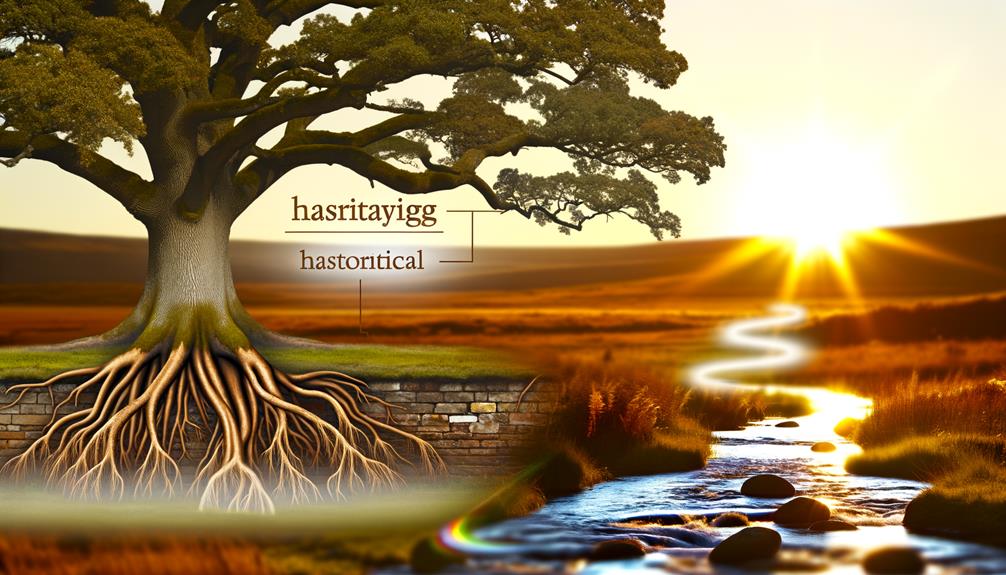Jacob Name Meaning in English
The name Jacob, derived from the Hebrew 'Yaakov', originates from the verb 'aqav', meaning 'to follow' or 'to be behind'. This name holds profound historical significance, tracing back to ancient Semitic languages and rich cultural narratives.
In the Bible, Jacob is a pivotal patriarch whose story in Genesis encapsulates themes of destiny, struggle, and divine favor. Over centuries, Jacob has been a symbol of faith, influencing religious traditions, literature, and art.
Its modern popularity persists, consistently ranking high in baby name lists worldwide. Explore further to uncover its enduring legacy and impact across various cultures.

Key Takeaways
- The name Jacob originates from the Hebrew name 'Yaakov' meaning 'to follow' or 'to be behind.'
- Jacob is a patriarchal figure in the Bible, central to the Genesis narrative.
- The name symbolizes themes of destiny, struggle, and divine favor.
- Jacob remains globally popular and has numerous variations in different languages.
- Famous Jacobs include Jacob Grimm, photojournalist Jacob Riis, and mathematician Jacob Bernoulli.
Origins of the Name Jacob
The name Jacob originates from the Hebrew name 'Yaakov,' which is derived from the Hebrew verb 'עקב' (aqav), meaning 'to follow' or 'to be behind.'
Linguistically, the etymology reflects a foundational cultural context, wherein names often encapsulate familial and societal roles. Historically, the name 'Yaakov' has been traced back to ancient Semitic languages, carrying connotations of supplanting or holding a position in a sequence.
This etymological foundation underscores the linguistic evolution and adaptation of the name into various languages, including Latin and Greek, ultimately leading to the English 'Jacob.'
The name's enduring usage across centuries highlights its deep-rooted significance and adaptability within diverse linguistic and cultural frameworks, reflecting a rich tapestry of historical and philological development.
Biblical Significance
In the context of biblical narratives, Jacob emerges as a pivotal patriarchal figure whose life story is intricately woven into the theological and moral fabric of the Hebrew Scriptures.
Jacob, later named Israel, is central to the Genesis account, where his journey from a cunning youth to a venerable patriarch illustrates profound themes of destiny, struggle, and divine favor.
His experiences—deceiving his brother Esau, wrestling with an angel, and fathering the twelve tribes of Israel—offer rich material for theological reflection.
Jacob's narrative underscores the complexity of human character and the transformative power of divine encounters. His life serves as a foundational element in understanding the covenantal relationship between God and the nation of Israel.
Cultural Impact
Beyond his biblical significance, Jacob's legacy permeates various cultures, reflecting his enduring influence on religious traditions, literature, and art throughout history. His story has inspired myriad interpretations and representations, underscoring his multifaceted impact.
Key areas of cultural significance include:
- Religious Traditions: Jacob is a patriarch in Judaism, Christianity, and Islam, symbolizing faith and divine promise.
- Literature: From John Milton's 'Paradise Lost' to contemporary novels, Jacob's narrative has been a source of literary exploration.
- Art: Renaissance and Baroque artists, like Rembrandt, frequently depicted Jacob, illustrating pivotal moments from his life.
- Folklore and Mythology: Jacob's story has seeped into various cultural mythologies, reflecting themes of struggle, identity, and redemption.
This multifaceted cultural footprint underscores Jacob's profound and lasting influence.
Modern Popularity
Anchored in centuries of tradition, the name Jacob continues to enjoy widespread popularity in modern times, consistently ranking high on baby name lists globally. This enduring appeal is rooted in its rich historical context and linguistic elegance. In the United States, Jacob has consistently been among the top choices for boys' names, reflecting its timeless charm and universal recognition. The name's resonance is not confined to English-speaking countries but extends to various cultures, each embracing its unique pronunciation and spelling variations. Below is a table illustrating the name's popularity in different countries over recent years:
| Country | Popularity Rank |
|---|---|
| United States | 5 |
| United Kingdom | 7 |
| Canada | 6 |
| Australia | 8 |
| Germany | 10 |
This data underscores Jacob's enduring global appeal.
Famous Jacobs
The widespread popularity of the name Jacob is further reflected in the numerous notable individuals who have borne this name throughout history and across various fields of achievement.
- Jacob Grimm: A pivotal figure in philology and folklore, he co-authored the renowned 'Grimm's Fairy Tales,' influencing Western literature to a great extent.
- Jacob Riis: A pioneering photojournalist and social reformer whose work highlighted the plight of impoverished communities in New York City during the late 19th century.
- Jacob Bernoulli: A Swiss mathematician known for his contributions to calculus and the study of probability, leaving an indelible mark on mathematical theory.
- Jacob Lawrence: An influential African American painter whose works vividly depict the African American experience, he is celebrated for his dynamic and narrative-driven art style.
Conclusion
To conclude, the name Jacob, with its profound biblical roots and significant cultural impact, continues to hold a prominent place in contemporary society.
Significantly, Jacob consistently ranks among the top 20 names for boys in the United States, reflecting its enduring appeal.
The name's historical context, from its ancient origins to its modern-day popularity, underscores its timeless relevance.
This ongoing prominence highlights the intricate interplay between tradition and modernity in naming practices.






